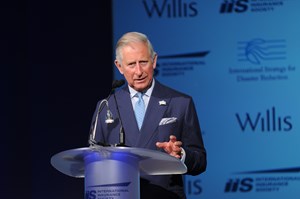HRH Charles, the Prince of Wales, addressed the International Insurance Society on Wednesday June 25. Speaking to a full house, the heir to the British throne called the gathering “a vitally important meeting on climate change, disaster risk reduction, resilience and the role of the private sector.”

Prince Charles, who has been in the forefront of efforts to increase public awareness of the dangers to the environment posed by climate change, acknowledged the work of others in this regard, notably Lady Lynn de Rothschild, who spoke earlier on the role of private capital in addressing resilience to disasters and the Willis Group’s Rowan Douglas, who organized the presentations in his role as chairman of the UN HFA (Hyogo Framework for Action).
He also described a previous effort with the Association of British Insurers to increase awareness of the threat posed by a warming world, which resulted in the formulation of the “ClimateWise” program aimed at “disaster risk reduction and climate change.” Unfortunately, the Prince said, no U.S. insurance or reinsurance company has so far joined the program, adding it “would be a jolly good thing if they did.”
The audience was told that their collective expertise is considered “of great value” in carrying forward efforts to promote resilience to disasters and implement remedial measures.
The next few years will be critical in doing so. The Hyogo Framework (named after the city in Japan where it was first established) will be the subject of negotiation for its renewal in March 2015, where, Prince Charles said, insurers would “have an important voice.” In September 2015 negotiations begin for the UN’s sustainable development goals, followed by an UN Conference in Paris in December and the World Humanitarian Summit in 2016.
In each of these climate negotiations, Prince Charles said a “strong and ambitious private sector commitment to this three way interlocking and mutually reinforcing set of UN negotiations” is a vital element if they are to be successful.
He stressed that more than declarations of good intent will be required, and more than just lofty words, as these negotiations will “shape decisions that do have a material impact on the entire planet and on its people. What we need now,” he continued, “are concrete, substantial and measurable commitments; nothing else will do.”
He said that revising the Hyogo framework “offers an important opportunity to build on and accelerate the significant progress that has been made in disaster risk reduction over the last ten years.” He also said: “Truly sustainable development has to be founded on the principles of resilience and a proper appreciation of the risk; but they in turn are underpinned by fundamentals such as citizens’ health, ecosystem functionality, and the need for all of humanity to live in harmony within the environment that sustains us.”
Prince Charles said “every sector of society” should be involved in disaster risk reduction; however, he called attention to the fact that only half of the countries assessing the progress in applying the strictures of the Hyogo framework had made any progress in doing so, particularly when it involves getting local businesses engaged in risk management.
“The private sector clearly has much to contribute to those discussions,” he continued – “financial institutions, insurance companies and institutional investors all have a role in assessing the risks to their businesses posed by climate change and natural disasters. And mark my words, ladies and gentlemen, the risks are catastrophic.”
Prince Charles cited the “devastating floods” in his country last winter as a prime example of the effects of a changing climate. He said that the choice between trying to identify and mitigate the effects from such natural disasters, while not cheap, should be compared to the even greater costs of failing to do anything.
Even the various agencies charged with coping with disasters spend the bulk of their time and their funds on disaster relief rather than implementing steps to “prevent and mitigate crises beforehand,” he said. While this posture is understandable, “that doesn’t make it right,” as advances in climate science and the use of “big data” have made it “an outdated approach,” he said.
Understanding why disasters happen—what the risks are—should be the first concern for both companies and nations as the “explosion of disaster risk on companies’ balance sheets— and indeed those of nations— would certainly concentrate the mind just as integration and capital reporting initiatives do,” said the Prince. Companies are in fact increasingly doing this, he added.
He stressed the need for urgency in action “to broker the ambitious, far-reaching, equitable, and indeed visionary accommodation of international agreements that we need in order to set the world on a more resilient course between now and 2015.”




















 Earnings Wrap: With AI-First Mindset, ‘Sky Is the Limit’ at The Hartford
Earnings Wrap: With AI-First Mindset, ‘Sky Is the Limit’ at The Hartford  Insurance Groundhogs Warming Up to Market Changes
Insurance Groundhogs Warming Up to Market Changes  Experts Say It’s Difficult to Tie AI to Layoffs
Experts Say It’s Difficult to Tie AI to Layoffs  Winter Storm Fern to Cost $4B to $6.7B in Insured Losses: KCC, Verisk
Winter Storm Fern to Cost $4B to $6.7B in Insured Losses: KCC, Verisk 









